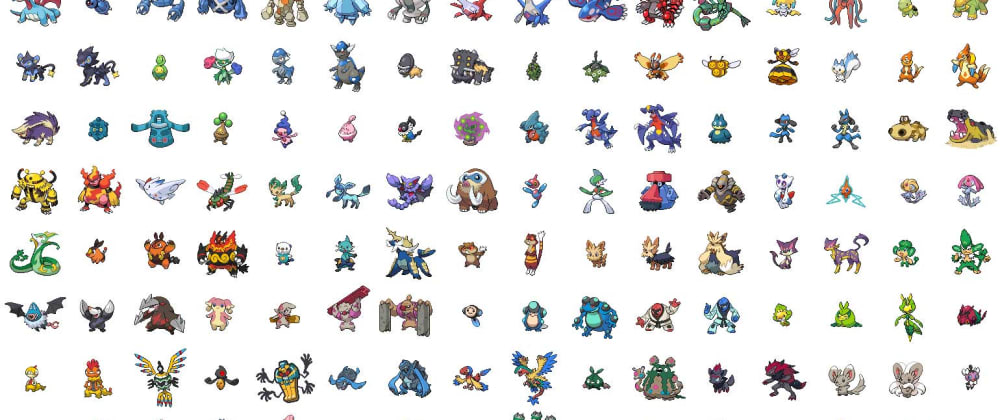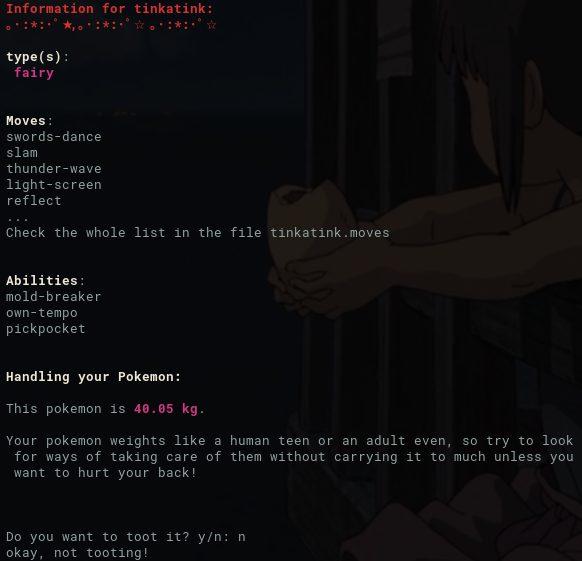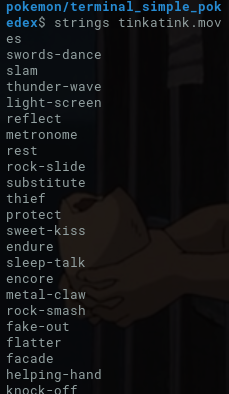I recently found an API for Pokemon and I wrote a simple Pokedex for fun using the data available.
The api is pretty straightforward, you give it the ID or name of a Pokemon, it give you back information in a json file. I used bash and jq to parse the information.
curl -s https://pokeapi.co/api/v2/pokemon/<my pokemon>
So, imagine we want to get the type of the Pokemon. Taking a quick look at the json, I check were the type is and then write:
strings $mipoke.json | jq -r '.types[].type.name'
While $mypoke is the Pokemon name. SOme of them have two types so I save them in variables and check the existence of the second one:
first_type=$(strings $mipoke.json | jq -r '.types[0].type.name')
second_type=$(strings $mipoke.json | jq -r '.types[1].type.name')
if [ -z "$second_type" ]; then
echo -e "$second_type"
fi
I though it would be fun to set colors according to the type, so created a palette in the header:
export COLOR_NC='\e[0m' # No Color
export COLOR_BLACK='\e[0;30m'
export COLOR_GRAY='\e[1;30m'
export COLOR_RED='\e[0;31m'
export COLOR_LIGHT_RED='\e[1;31m'
export COLOR_GREEN='\e[0;32m'
export COLOR_LIGHT_GREEN='\e[1;32m'
export COLOR_BROWN='\e[0;33m'
export COLOR_YELLOW='\e[1;33m'
export COLOR_BLUE='\e[0;34m'
export COLOR_LIGHT_BLUE='\e[1;34m'
export COLOR_PURPLE='\e[0;35m'
export COLOR_LIGHT_PURPLE='\e[1;35m'
export COLOR_CYAN='\e[0;36m'
export COLOR_LIGHT_CYAN='\e[1;36m'
export COLOR_LIGHT_GRAY='\e[0;37m'
export COLOR_WHITE='\e[1;37m'
And then I created a basic conditional to set the color for the types:
# initializing color variables
color1="${COLOR_WHITE}"
color2="${COLOR_WHITE}"
...
#creating a function so I don't
#commit redundancy in both types
check_colors() {
tipo=$1
color="${COLOR_WHITE}"
if [[ "$tipo" = "fairy" || "$tipo" = "psychic" ]]; then
color="${COLOR_LIGHT_PURPLE}"
elif [[ "$tipo" = "steel" || "$tipo" = "normal" ]]; then
color="${COLOR_LIGHT_GRAY}"
elif [[ "$tipo" = "grass" || "$tipo" = "bug" ]]; then
color="${COLOR_GREEN}"
elif [[ "$tipo" = "water" || "$tipo" = "ice" ]]; then
color="${COLOR_BLUE}"
elif [ "$tipo" = "poison" ]; then
color="${COLOR_PURPLE}"
elif [ "$tipo" = "electric" ]; then
color="${COLOR_YELLOW}"
fi
echo "$color"
}
...
#setting the color for the first type
color1="$(check_colors $first_type)"
#if second type exists, setting the color, too
if [ -z "$second_type" ]; then
color2="$(check_colors $second_type)"
echo -e "$color2 $second_type ${COLOR_NC}"
fi
Now the next two interesting things might be moves and abilities.I realized in a quick test that moves are too many, so I opted for showing a small sample and saving all the rest in a different file:
strings $mipoke.json | jq -r '.moves[].move.name' | head -n5
echo "...\nCheck the whole list in the file $mipoke.moves"
strings $mipoke.json | jq -r '.moves[].move.name' >> $mipoke.moves
Abilities aren't usually too many, so I kept them simple:
strings $mipoke.json | jq -r '.abilities[].ability.name'
I decided I wanted to do a charming detail so I captured the weight:
weight=$(strings $mipoke.json | jq -r '.weight')
Converted it to kg (it's in lbs):
inkg=$(bc <<< "scale=2; $weight*0.45")
And then use it in a conditional so to give advice on how to handle the Pokemon:
inkg_int=$(bc <<< "$inkg/1")
inkg_int=$(($inkg_int))
if [[ "$inkg_int" -lt 35 && "$inkg_int" -gt 10 ]]; then
consejo="That means you can carry it for a while, but you can hurt you back! let them walk"
elif [[ "$inkg_int" -lt 11 && "$inkg_int" -gt 5 ]]; then
consejo="That means is your pokemon is quite light and you might be able to carry it around a lot."
elif [ "$inkg_int" -lt 6 ]; then
consejo="That means your pokemon is very light, tiny cute baby, and you might even be able to carry it around in a bag, if it pleases them."
elif [[ "$inkg_int" -lt 60 && "$inkg_int" -gt 34 ]]; then
consejo="Your pokemon weights like a human teen or an adult even, so try to look for ways of taking care of them without carrying it to much unless you want to hurt your back!"
elif [[ "$inkg_int" -lt 200 && "$inkg_int" -gt 59 ]]; then
consejo="Your pokemon might be a little bit too heavy for carrying it, so don't attempt to do it. Nevertheless look for alternatives such as patting and saying nice words."
else
consejo="Your pokemon is a thicc baby, they won't expect you to carry it. But they will probably like pats and nice words."
fi
echo "$consejo"
It was pretty much done. I added some visual details (further colors, sparkles) and the possibility of tooting in your mastodon the final information. For that I duplicated every print into a file and then:
read -p"Do you want to toot it? y/n: " ANS
if [[ "$ANS" = "y" || "$ANS" = "Y" ]]; then
toot post "$(strings mytoot)"
else
echo "okay, not tooting!"
fi
And that's it!
Here's the repo.





















